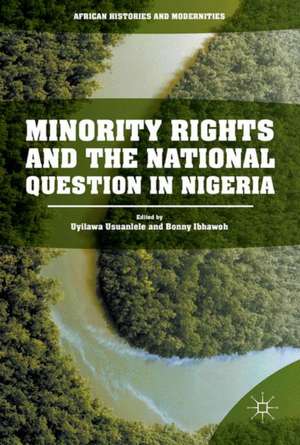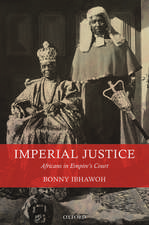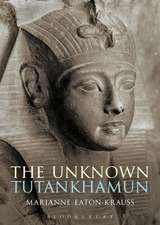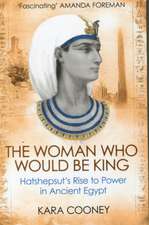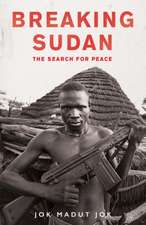Minority Rights and the National Question in Nigeria: African Histories and Modernities
Editat de Uyilawa Usuanlele, Bonny Ibhawohen Limba Engleză Hardback – 29 mar 2017
| Toate formatele și edițiile | Preț | Express |
|---|---|---|
| Paperback (1) | 693.57 lei 6-8 săpt. | |
| Springer International Publishing – 8 mai 2018 | 693.57 lei 6-8 săpt. | |
| Hardback (1) | 698.94 lei 6-8 săpt. | |
| Springer International Publishing – 29 mar 2017 | 698.94 lei 6-8 săpt. |
Din seria African Histories and Modernities
- 15%
 Preț: 695.01 lei
Preț: 695.01 lei - 20%
 Preț: 815.67 lei
Preț: 815.67 lei - 15%
 Preț: 577.54 lei
Preț: 577.54 lei - 15%
 Preț: 587.85 lei
Preț: 587.85 lei - 15%
 Preț: 642.51 lei
Preț: 642.51 lei - 18%
 Preț: 733.33 lei
Preț: 733.33 lei - 18%
 Preț: 734.27 lei
Preț: 734.27 lei -
 Preț: 384.09 lei
Preț: 384.09 lei - 18%
 Preț: 739.31 lei
Preț: 739.31 lei -
 Preț: 418.45 lei
Preț: 418.45 lei - 15%
 Preț: 694.69 lei
Preț: 694.69 lei - 9%
 Preț: 753.50 lei
Preț: 753.50 lei - 15%
 Preț: 641.71 lei
Preț: 641.71 lei - 15%
 Preț: 704.17 lei
Preț: 704.17 lei - 18%
 Preț: 733.33 lei
Preț: 733.33 lei - 15%
 Preț: 703.38 lei
Preț: 703.38 lei - 15%
 Preț: 527.32 lei
Preț: 527.32 lei -
 Preț: 485.61 lei
Preț: 485.61 lei -
 Preț: 386.99 lei
Preț: 386.99 lei - 15%
 Preț: 704.87 lei
Preț: 704.87 lei - 18%
 Preț: 781.45 lei
Preț: 781.45 lei - 18%
 Preț: 894.97 lei
Preț: 894.97 lei - 15%
 Preț: 641.16 lei
Preț: 641.16 lei - 15%
 Preț: 643.16 lei
Preț: 643.16 lei - 18%
 Preț: 783.20 lei
Preț: 783.20 lei - 15%
 Preț: 643.00 lei
Preț: 643.00 lei - 18%
 Preț: 900.49 lei
Preț: 900.49 lei - 15%
 Preț: 699.59 lei
Preț: 699.59 lei - 15%
 Preț: 644.49 lei
Preț: 644.49 lei - 15%
 Preț: 587.53 lei
Preț: 587.53 lei - 15%
 Preț: 703.06 lei
Preț: 703.06 lei - 15%
 Preț: 587.39 lei
Preț: 587.39 lei - 15%
 Preț: 582.63 lei
Preț: 582.63 lei - 15%
 Preț: 586.88 lei
Preț: 586.88 lei -
 Preț: 385.47 lei
Preț: 385.47 lei - 15%
 Preț: 703.71 lei
Preț: 703.71 lei - 18%
 Preț: 744.22 lei
Preț: 744.22 lei - 15%
 Preț: 590.95 lei
Preț: 590.95 lei - 15%
 Preț: 587.53 lei
Preț: 587.53 lei
Preț: 698.94 lei
Preț vechi: 822.29 lei
-15% Nou
Puncte Express: 1048
Preț estimativ în valută:
133.74€ • 139.64$ • 110.69£
133.74€ • 139.64$ • 110.69£
Carte tipărită la comandă
Livrare economică 04-18 aprilie
Preluare comenzi: 021 569.72.76
Specificații
ISBN-13: 9783319506296
ISBN-10: 3319506293
Pagini: 246
Ilustrații: XV, 253 p.
Dimensiuni: 148 x 210 x 16 mm
Greutate: 0.48 kg
Ediția:1st ed. 2017
Editura: Springer International Publishing
Colecția Palgrave Macmillan
Seria African Histories and Modernities
Locul publicării:Cham, Switzerland
ISBN-10: 3319506293
Pagini: 246
Ilustrații: XV, 253 p.
Dimensiuni: 148 x 210 x 16 mm
Greutate: 0.48 kg
Ediția:1st ed. 2017
Editura: Springer International Publishing
Colecția Palgrave Macmillan
Seria African Histories and Modernities
Locul publicării:Cham, Switzerland
Cuprins
1. Introduction: Minorities and the National Question in Nigeria.- I. Minorities, Colonialism and Decolonization.- 2. Decolonization and the Minority Question in Nigeria: The Willink Commission Revisited.- 3. Historicizing Ethnic Groups’ Movements and State Creation in Nigeria, 1947-1967.- 4. Minority Groups: Bridgeheads in Nigerian Politics, 1950s – 1966.- II. Minorities and Postcolonial Politics.- 5. The Owegbe Cult: Political and Ethnic Rivalries in Early Post-Colonial Benin City.- 6. Midwest Region’s Non-Igbo Minorities Responses to Biafran Occupation and Federal Liberation in the Nigerian Civil War, 1967-1970.- 7. Ethnicity, War and Military Politics in Nigeria.- III. Minorities and Contemporary Nation-Building.- 8. Willink’s Report, Niger Delta Region and the Nigerian State Fifty Years After: Any Hope for the Minority?.- 9. National Integration, Citizenship, Political Participation and Democratic Stability in Nigeria.- 10. Ethnic Minorities and the Quest for National Integration in Nigeria: Federalism and State Creation to the Rescue.- 11. Religious Referent Power and Ethnic Militias in Nigeria: The Imperative for PaxNigeriana
Notă biografică
Uyilawa Usuanlele is Associate Professor of History at the State University of New York (SUNY) Oswego, USA.
Bonny Ibhawoh is Professor of African History and Global Human Rights at McMaster University, Canada.
Textul de pe ultima copertă
This book offers a thematic study of key debates in the history of the ethnic politics, democratic governance, and minority rights in Nigeria. Nigeria provides a framework for examining the central paradox in post-colonial nation building projects in Africa – the tension between majority rule and minority rights. The liberal democratic model on which most African states were founded at independence from colonial rule, and to which they continue to aspire, is founded on majority rule. It is also founded on the protection of the rights of minority groups to political participation, social inclusion and economic resources. Maintaining this tenuous balance between majority rule and minority rights has, in the decades since independence, become the key national question in many African countries, perhaps none more so than Nigeria. This volume explores these issues, focusing on four key themes as they relate to minority rights in Nigeria: ethnic and religious identities, nationalism and federalism, political crises and armed conflicts.
Caracteristici
Traverses several related disciplines – African History Philosophy, Sociology, Anthropology and Political Science Provides an outstanding overview of human rights in Nigeria with debates about minority rights from the perspectives of colonized peoples Includes chapters from the leading academics in Nigerian history and politics
